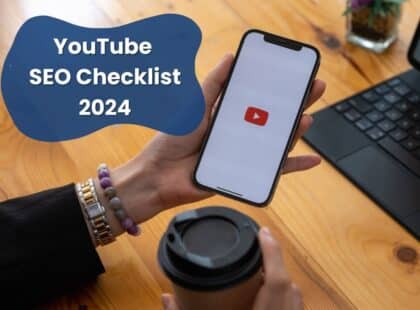
What Is YouTube SEO? 2024 YouTube SEO Checklist
In today’s fast-paced digital world, video content has become a crucial me [...]

In today’s digital world, having a strong SEO strategy is crucial for entrepreneurs and small businesses. A well-implemented SEO plan can greatly improve your website’s ranking in search results, increase organic traffic, and ultimately drive sales.
Table of Contents
According to AIOSEO, 68% of online experiences begin with a search engine, highlighting just how vital SEO is.
However, many small business owners find SEO complicated and overwhelming. This guide simplifies the process, breaking it down step-by-step so you can build a robust SEO strategy that will help your business thrive.
An SEO strategy is a comprehensive plan designed to improve a website’s visibility in search engines and drive organic traffic. For entrepreneurs and small business owners, understanding and implementing a strong SEO strategy is essential for staying competitive in today’s crowded digital space. The key to success lies in optimizing various aspects of your website, from content and keywords to technical performance and user experience. According to HubSpot, businesses that prioritize SEO are 13 times more likely to see positive ROI than those that don’t.
For small business owners who are often limited by time and resources, having a clear SEO strategy provides a roadmap to follow, making the complex world of SEO more manageable and effective in driving sustainable growth.
Building a successful SEO strategy might seem overwhelming for entrepreneurs and small businesses, but by breaking it down into manageable steps, it becomes more accessible and effective. Here’s a comprehensive step-by-step guide.
Before starting, it’s important to clarify what you want to achieve with your SEO strategy. Whether your goal is increasing organic traffic, generating leads, or improving brand awareness, having clear objectives will guide your SEO efforts and help measure success.
As HubSpot notes, aligning your SEO strategy with business goals ensures you’re making progress where it matters most.
The basis of your SEO approach is keyword research. It involves identifying the phrases your target audience is searching for and using them strategically within your content. Tools like Google Keyword Planner and Ahrefs or even Google search box are great for finding keywords with high search volume and low competition.
After searching for your primary keyword, the next crucial step is to review the filters that Google generates. According to Backlinko, long-tail keywords account for 70% of all searches, which means focusing on specific, niche queries is a smart approach for small businesses.
Creating content that is both valuable to users and optimized for search engines is a crucial element of any SEO strategy. This means not just focusing on keywords but also producing high-quality, engaging content that addresses the needs and pain points of your audience.
According to HubSpot, businesses that publish regular blog posts generate 55% more website visitors.
For small businesses, this could involve writing educational blog posts, product guides, or FAQs that provide answers to common customer questions while incorporating relevant keywords naturally.
Optimizing individual pages to get better search engine rankings and more relevant traffic is known as on-page SEO. For your target keywords, this entails optimizing headers, content, title tags, and meta descriptions. You also want to ensure that your content is user-friendly and engaging. According to AIOSEO, pages that rank in the top 10 search results typically have an average of 1,447 words, indicating the importance of in-depth, optimized content.
Technical SEO ensures that your website’s infrastructure is optimized so that search engines can crawl and index your site effectively. This includes improving page speed, ensuring mobile responsiveness, implementing HTTPS for security, and fixing broken links or redirects.
According to HubSpot, mobile-friendliness is a critical ranking factor, as 61% of mobile users are more likely to contact a business with a mobile-optimized site.
Images play a significant role in user experience, but they also impact SEO. Proper image optimization involves compressing images to improve page load speed and using descriptive file names and alt text.
HubSpot indicates that optimized images help search engines understand the content of the image and improve the overall SEO of your site.
Faster-loading pages with properly optimized images contribute to better rankings and user engagement.
Internal links guide users to other valuable pages on your website and help distribute page authority throughout your site. Building a strong internal linking structure also improves the crawlability of your website, making it easier for search engines to find and index your content. As noted by HubSpot, internal linking is crucial for improving user experience and boosting rankings.
Off-page SEO, particularly link building, is critical for building your website’s authority. Reputable websites sending high-quality backlinks to your website tell search engines that it’s reliable and pertinent. As Backlinko states, the top-ranking pages on Google have significantly more backlinks than those ranked lower. Start by engaging in guest blogging, collaborating with influencers, and building relationships with other reputable websites to improve your link profile.
who aim to attract local clients. Optimizing your Google My Business profile, collecting customer reviews, and using local keywords are key actions for improving visibility in local search results. According to AIOSEO, 46% of all Google searches are seeking local information, so this step is crucial for small businesses with a local focus.
It takes constant monitoring and adjustment to achieve optimal results from SEO. Track your performance using tools like Google Analytics, Ahrefs, or SEMrush, and make data-driven decisions. Regularly assess your keyword rankings, traffic, and overall site performance. As HubSpot notes, continually refining your strategy based on insights will help you stay competitive and improve your results over time.
For entrepreneurs and small businesses, an effective SEO strategy is crucial for standing out in today’s competitive online landscape. SEO is not just about improving search engine rankings; it’s about increasing visibility, driving organic traffic, and ultimately converting visitors into customers. According to AIOSEO, 53.3% of all website traffic comes from organic search, making SEO the largest driver of website visitors. Without a proper strategy, businesses miss out on these potential customers. Moreover, SEO helps build trust and credibility, as users are more likely to trust websites that appear at the top of search results. For small businesses with limited marketing budgets, SEO offers one of the most cost-effective ways to grow. When executed properly, it delivers long-term results without the ongoing costs of paid advertising.
The acronym SEO E-E-A-T stands for Expertise, Authority, Trustworthiness, and Experience. It’s a concept introduced by Google to evaluate the quality of content and websites, particularly those that impact a person’s health, financial stability, or overall well-being (commonly referred to as “Your Money or Your Life” or YMYL content). E-E-A-T plays a critical role in determining how Google ranks a website, and understanding it is crucial for entrepreneurs and small business owners who want to build trust and improve their SEO performance.
| E-E-A-T Factor | Definition | Importance for SEO | How to Improve |
| Experience | Content based on firsthand experience in the subject matter. Shows the creator’s real-life experience. | Google values firsthand experiences to rank content higher, especially for reviews and product use cases. | Showcase case studies, testimonials, or real-world experiences in your field. |
| Expertise | Content created by someone with relevant knowledge and qualifications in the field. | Establishes the content’s credibility, particularly in fields like health, finance, and legal advice. | Ensure content is written or reviewed by qualified professionals or industry experts. |
| Authoritativeness | Refers to the recognition and reputation of the content creator or website in the industry. | Boosts search rankings by proving authority in the industry through recognition from others. | Acquire high-authority backlinks and build a strong reputation in your industry. |
| Trustworthiness | Relates to the reliability and transparency of the website. Focuses on secure, credible, and factual content. | Improves search rankings by offering transparent, secure, and accurate information that users can trust. | Maintain site security (HTTPS), provide accurate content, and encourage positive user reviews. |
An SEO strategy template serves as a roadmap for improving your website’s search engine rankings, driving organic traffic, and enhancing overall online visibility. For entrepreneurs and small businesses, having a clear, step-by-step plan makes the complex world of SEO more manageable. This template will guide you through the essential elements needed to create a successful SEO strategy that aligns with your business goals.
Here is an example of a 6-month SEO strategy that you might use it for your business:
A well-crafted SEO strategy is an investment in your business’s long-term success and visibility. By combining on-page, off-page, and technical SEO, you can attract visitors and convert them into loyal customers. Staying proactive as search engines evolve will keep your business ahead of the competition.
Looking for expert guidance to get started? Marketing Spotlight offers a free consultation to help you explore whether SEO is the right fit for your business. Let us craft a customized SEO strategy designed to elevate your brand and boost your online performance.

I’ve had a smooth experience working with Marketing Spotlight team. They helped me develop a website, create a marketing strategy and set up marketing automation.

Marketing Spotlight transformed our marketing efforts with their automation services. The seamless integration and efficiency they brought to our campaigns have been a game-changer. Our customer engagement in the UAE has never been better!
The meeting link will be shared with you via email after you finish booking a call.